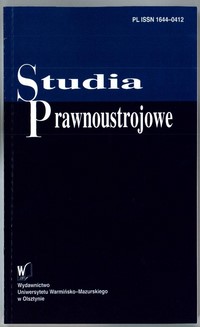Prawo osadzonych do korzystania z posług religijnych w dobie pandemii COVID-19
The right of inmates to religious practices in the COVID-19 pandemic
Author(s): Justyna KrzywkowskaSubject(s): Human Rights and Humanitarian Law, Health and medicine and law, Penology, Sociology of Religion
Published by: Wydawnictwo Uniwersytetu Warmińsko-Mazurskiego w Olsztynie
Keywords: prison chaplain; freedom of conscience; freedom of religion; pandemic; prison director; religious beliefs;
Summary/Abstract: The spreading SARS-Cov-2 virus has resulted in a tightening of prison procedures in Poland. To minimise the epidemiological risk, directors of prisons and pre-trial detention centres in Poland, in consultation with the competent penitentiary judges, in most cases, suspended the possibility of religious services by chaplains towards inmates for over a year (from March 2020 to June 2021). The function of a prison chaplain is assigned to a specific clergyman by the church authority. In Poland, the pastoral service in prisons and pre-trial detention centres is performed by chaplains who are representatives of religious communities entered in the register of churches and other religious associations kept by the Minister of the Interior and Administration or having an individual denominational statute. Some of these people perform their pastoral while others do so as part of a charity. The ministry of chaplains is manifested in performing works of mercy, preaching the word of God, or administering the holy sacraments. Undoubtedly, the religious practices of prisoners are a way of satisfying their individual needs, as well as striving for acceptance, understanding and forgiveness. This article aims at showing how the implementation of the right of inmates to religious freedom looks in practice during the SARS-CoV-2 coronavirus pandemic. Various restrictions have been introduced: from a total ban on prison chaplains from entering the premises of penitentiary units to conducting only individual religious services, to the current possibility of celebrating Holy Mass with 75% of the places in the prison chapel are filled. Many chaplains of prisons and pre-trial detention centres think that the introduced restrictive provisions have had negative effects on the spiritual sphere of inmates, as evidenced by the drastic decline in inmates accepting a religious service.
Journal: Studia Prawnoustrojowe
- Issue Year: 2022
- Issue No: 55
- Page Range: 147-158
- Page Count: 12
- Language: Polish

